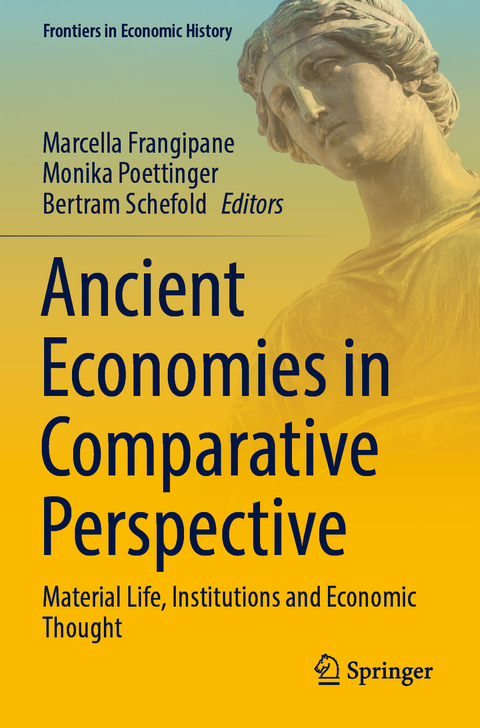
Ancient Economies in Comparative Perspective
Springer International Publishing (Verlag)
978-3-031-08765-3 (ISBN)
This book investigates the economic organization of ancient societies from a comparative perspective. By pursuing an interdisciplinary approach, including contributions by archaeologists, historians of antiquity, economic historians as well as historians of economic thought, it studies various aspects of ancient economies, such as the material living conditions including production technologies, etc.; economic institutions such as markets and coinage; as well as the economic thinking of the time. In the process, it also explores the comparability of economic thought, economic institutions and economic systems in ancient history. Focusing on the Ancient Near East as well as the Mediterranean, including Greece and Rome, this comparative perspective makes it possible to identify historical permanencies, but also diverse forms of social and political organization and cultural systems. These institutions are then evaluated in terms of their capacity to solve economic problems, such as the efficient use of resources or political stability.
The first part of the book introduces readers to the methodological context of the comparative approach, including an evaluation of the related historiographical tradition. Subsequent parts discuss a range of development models, elements of economic thinking in ancient societies, the role of trade and globalization, and the use of monetary and financial instruments, as well as political aspects.
lt;p>Marcella Frangipane is a Full Professor of Prehistory and Protohistory of the Near and Middle East at the Sapienza University of Rome, Italy. She has participated in field research in Mexico, Italy, Egypt and Turkey, becoming the director of the Italian Archaeological Expedition in Eastern Anatolia. She is a Foreign Associate Member of the National Academy of Sciences (USA), and a Corresponding Member of both the German Archaeological Institute in Berlin and the Accademia Nazionale dei Lincei, Rome., She has received various awards for her research at Arslantepe.
Monika Poettinger teaches economic history and history of economic thought at Bocconi University and the University of Florence, Italy. Her research focuses on the impact of foreign entrepreneurship on the industrialization process, the functioning of international merchant networks, liberal economic thought and the heterodox economics of Otto Neurath and Amintore Fanfani. In addition, she has organized international conferences and seminars and published in journals and collected volumes.
Bertram Schefold is a Senior Professor at the Faculty of Economics and Business Administration, Goethe University in Frankfurt, Germany. Currently serving as Honorary President of the European Society for the History of Economic Thought, he has published more than 40 books and 250 articles on economic theory, history of economic thought, energy policy and general economic policy. He edited the series Klassiker der Nationalökonomie.Part I: Methodology for the Economic History and the History of Economic Thought of Antiquity.- Part II: Development Models.- Part III: Trade, Specialisation and Growth.- Part IV: Debts, Slaves and Finance.
| Erscheinungsdatum | 12.09.2023 |
|---|---|
| Reihe/Serie | Frontiers in Economic History |
| Zusatzinfo | VI, 371 p. 47 illus., 13 illus. in color. |
| Verlagsort | Cham |
| Sprache | englisch |
| Maße | 155 x 235 mm |
| Gewicht | 575 g |
| Themenwelt | Geschichte ► Teilgebiete der Geschichte ► Wirtschaftsgeschichte |
| Wirtschaft ► Allgemeines / Lexika | |
| Schlagworte | Ancient history • Ancient Near East • Antiquity • archaeology • Economic anthropology • Economic History • Economic systems in ancient history • German history of economic thought • Greek economic thought • Historical School • History of Ancient Greece • history of ancient rome • History of comparative economic thought • History of Economic Thought • Palace economies • political economies • Prehistoric societies • Pre-monetary economies • Protohistoric economies |
| ISBN-10 | 3-031-08765-8 / 3031087658 |
| ISBN-13 | 978-3-031-08765-3 / 9783031087653 |
| Zustand | Neuware |
| Informationen gemäß Produktsicherheitsverordnung (GPSR) | |
| Haben Sie eine Frage zum Produkt? |
aus dem Bereich


